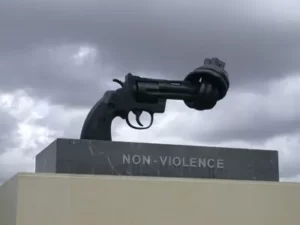
Since 2007, every year, on the 2nd of October, comes the International Day of Non-Violence. The 2nd of October is an occasion to push for non-violence through education and public awareness. It also marks Mahatma Gandhi’s birthday, who believed it was irrational to use violence to try and gain a peaceful society.
Gandhi was the leader of India’s independence movement, and a proponent of the philosophy and strategy of non-violence. His movement for change in society and politics has been followed by oppressed people across the world.
Achieving social change through non-violent means, such as civic resistance, non-compliance, and civil disobedience has been employed throughout history.
![]()


